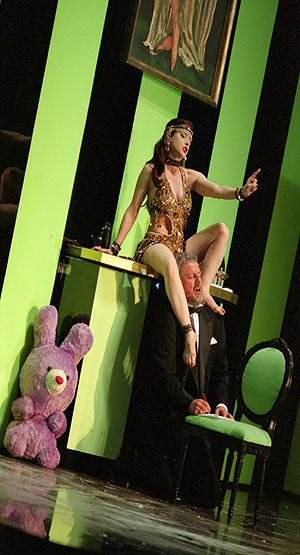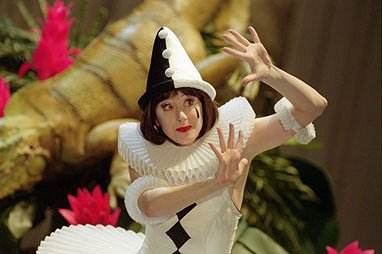S & H Opera Review
Berg, Lulu, English National Opera, 16th May 2002 (MB)
Early reviews of this new production, jointly done with opera companies in Israel and Frankfurt, suggested that some of the stage management needed ironing out. This hadn’t quite been resolved by this, the third performance; indeed, at one stage it looked as if we might not get beyond the prologue. We did, and what followed was an often searing performance of one of the masterpieces of the operatic repertoire.Berg’s score, much easier on the ear than that he composed for Wozzeck, is full of beauties – notably in the Interludes; it remains unfathomable why people persist in the belief that this is difficult music. Played as it was here, with lush and full-bodied tone, it resembled more the opulence of a Strauss tone poem. Indeed, the Second Interlude is pure Mahler and Paul Daniel’s and the superb ENO orchestra made much of the tonal sonorities, setting up an interesting contrast with the on stage action. Very rarely did the orchestra seem to overpower the singers (in fact, this only ever happened in the Cerha completed Act III).
Richard Jones’ production gives this Lulu a seedy 1950s feel to it. Opening on the façade of a peepshow, with its mixed clientele paying for entrance – pure Michael Huhn imagery – a chiffon curtain is raised to allow us to peek beyond the window, all jungle imagery with a lone Lulu standing like a puppet amidst the greenery. This is the artist’s studio, an unquestionably appropriate place for the copulation which follows – animalistic in its brutality, simple in its instinctive loveless foreplay. The set designs for this production are lavishly detailed – whether it be the theatre dressing room with its tableau of fluffy bears, or cheap china dogs inanimately placed around the room like spectators, or the room in Dr Schön’s house with its impressionable comfort, the setting for his brutal murder.
The same room a year later opens with Countess Geschwitz in nurses uniform – the colour of the previous settings bleached white, rather as if the set from One Flew Over the Cuckoo’s Nest had mysteriously appeared from nowhere. By the time we get to Act III the contrasts between the Paris and London sets are poles apart – the former opulent to emphasise the greed of the share dealing, the latter a base barren wasteland with just a sofa to illuminate the tawdriness of Lulu’s first day as a prostitute. Alwa’s syphilitic insanity isn’t so much displayed as an institutionalised illness but a symptom of poverty and neglect. Gone is the handsome suitor; he is now a chained madman closer than ever to the baseness of Lulu’s own condition. When Countess Geschwitz arrives with the lost portrait of Lulu it is not a complete picture – just the head shorn from the rest of the canvas. And whilst Lulu’s first client is a bible bashing conversionist, her last is the hell that is Jack the Ripper. Lulu’s death is almost done behind closed doors, yet its brutality is not questioned. Neither is the attack on the Countess, pure stalk and slash.
Jones leaves his most shocking revelation to last – we return full circle to the opening set and the front of the peepshow. The clientele leave, the familiar figures of Alwa and the Countess and then Lulu, hiding behind dark glasses and a raincoat, leave as well. The chiffon curtains falls – we, the audience, have been spectators on our own peepshow. It is an unexpected reversal, and an effective one.
Buki Shiff’s costume designs are effective, if a little uninspired at times. Lulu is either dressed in opulent ball gowns or leather; Countess Geschwitz is mostly power dressed; the men are rather non-descript, and Jack the Ripper hardly the shock he should ideally be in a striped sweater (and not even a Freddy Kruger one). Lighting by Pat Collins is effectively done.
Lisa Saffer makes an ideal Lulu, dramatically compelling to watch, and with a voice to equal the sustained high note writing which Berg gives his protagonist. Susan Parry as the Countess was also in fine voice, although it was only in her final scene with a telephone cord wrapped around her neck that she really seemed to achieve the beauty of tone of which she is capable. John Graham-Hall’s Alwa was splendid, Robert Haywood an excellent Dr Schön, a less compelling Jack the Ripper. Robert Poulton as the Acrobat and Animal Tamer relished his roles, and relished the translation by Richard Stokes with its primeval, base language.
Although I remain unconvinced that Frederich Cerha’s Third Act completion is wholly satisfactory this was one of the most compelling productions of Lulu I have seen. It is gritty and beautiful in equal measure, and a triumph for ENO. It runs until 30th May.
After a sequence of variable productions and revivals it is a pleasure to welcome ENO's lavish premiere of Lulu in which everything went right. The expenses are shared in co-production with opera companies in Israel and Frankfurt and supported by the Friends of ENO and a syndicate of individuals. The three-act version completed by Friedrich Cerha, in a new translation by Richard Stokes, makes for a full evening, but swift action ensures that tedium never sets in and enough of the words were audible to follow the steps of the eponymous anti-heroine's gradual descent to death in the arms of Jack the Ripper.
Lisa Saffer enacts a sequence of personas, variously calling herself Nelly, Eve, Mignon and Adelaide, in Buki Shiff's succession of costumes, a marvel of characterisations in acting and coloratura singing at the same time, her diminutive figure totally dominating all the men in her life and we the audience. The supporting cast is strong throughout and Paul Daniel provides sensitive and sensuous orchestral support, which is always considerate to the singers. The large cast was deployed skilfully in Paul Steinberg's stunning sets, often up and down a splendid stairway and into various hiding places. Pat Collins (lighting designer) was presumably responsible for one remarkable colour transformation of the walls.
A huge team effort, which will go into the annals of great productions of one of the most important 20 C. operas.
Peter Grahame Woolf
Performance Dates
May 1 / 10 / 16 / 23 / 28 / 30 at 7.00pm
May 18 / 25 at 5.30pm
May 16 sign language interpreted performance
The performance running time is approximately 3 hours 40 minutes


 Return to:
Return to: